In Japanese, chigau 違う means literally "to differ," but it's typically used to say someone got something "wrong," to say it "is different" from what they said, to deny what someone said, i.e. to say "no" in Japanese.
Grammar
The word chigau 違う is a stative verb, which means that it's normally used in nonpast form, rather than ~te-iru ~ている form.
- sore wa chigau
それは違う
That differs. (literally.)
That's not the same thing.
That's wrong, that's different.
Literally, chigau means "to differ," but we don't normally say the verb "to differ" in English, instead we say the adjective "to be different."
Both phrases have a stative lexical aspect: if you say something "differs" in present tense, then it "is different" in present tense. It just happens that in Japanese the verb chigau is used instead of an adjective.
Conjugation
For reference, how to conjugate chigau:
| ∅ | Polite form. | |
|---|---|---|
| Nonpast form. | chigau 違う |
chigaimasu 違います |
| Past form. | chigatta 違った |
chigaimashita 違いました |
| Negative form. | chigawanai 違わない |
chigaimasen 違いません |
| Past negative form. | chigawanakatta 違わなかった |
chigaimasen deshita 違いませんでした |
| ~te-iru form | chigatte-iru 違っている |
chigatte-imasen 違っていません |
~と~は違う
The word chigau can be used with the to と particle to say one thing is different to another.
- kore to sore wa chigau
これとそれは違う
This and that differ.
This and that are different things. - ore wa aitsu to wa chigau
俺はあいつとは違う
I differ with him.
I'm different from him.
I'm not the same as him.
- Context: a doctor talks to a patient in wheelchair, who is also a criminal.
- ningen wa yari-naoseru.
人間はやり直せる。
Humans can do-over.
Humans can [start again].
- yari-naoseru - potential verb.
- yari-naosu
やり直す
To do over.
To do something again. - yaru
やる
To do.
- ima kara demo osokunai......
いまからでも遅くない・・・・・・
Even from now isn't late......- You can still start over, it isn't too late to begin now.
- sensei......
先生・・・・・・
Doctor...... - sensei to ore,
anmari toshi
chigawanai kedo............
先生と俺、あんまり年違わないけど・・・・・・・・・・・・
[You] and me, [our] ages don't differ much, but.........
We're about the same age, but......... - sensei...... oyaji mitai da.
先生・・・・・・親父みたいだ。
[You]...... are like [my] father.
With Adverb
Like any verb, chigau can be modified by adverbs.
- sore wa sukoshi chigau
それは少し違う
That differs a little.
That's a little different.
You got it a bit wrong. - sore wa zenzen chigau
それは全然違う
That differs completely.
That's completely different.
You got it completely wrong. - {bimyou ni} chigau
微妙に違う
[It] {strangely} differs.
It's somehow off.
It's not quite the same thing. - {mattaku chigau} mono desu
全く違うものです
[It] is a thing [that] {differs completely}.
[It] is a {completely different} thing.
"Wrong" in Japanese
More often than not, chigau is used to say something is "wrong," "not right," that someone has gotten the wrong idea about something, that reality "is different," and then the speaker is probably going to try to clear up any misunderstanding.
- Context: Nagai Kei 永井圭 survives what should be a fatal traffic accident involving a truck, just after news that there's a monetary reward for finding immortal people, and tries to save himself from a greedy mob gathering around his regenerated self.
- iya............
いや・・・・・・・・・・・・
No............ - chigau tte.........
ちがうって・・・・・・・・・
[I'm] telling [you] it's not what you think............ - ningen.........
人間・・・・・・・・・
Human......... - ningen............
人間・・・・・・・・・・・・
Human............ - boku wa............
僕は・・・・・・・・・・・・
I'm............- Note: Japanese often makes use of right-dislocated sentences that look like Yoda speak:
- ningen da, boku wa
人間だ、僕は
"Am human, I." - boku wa ningen da
僕は人間だ
I'm human.
Anime: Chuunibyou demo Koi ga Shitai! 中二病でも恋がしたい! (Episode 1)
- Context: Isshiki Makoto 一色誠 asks Togashi Yuuta 富樫勇太 about his relationship with a (troublesome) girl. Yuuta firmly denies having any relationship with her at all, prompting Makoto to question his sexuality.
- nanda, omae moshikashite...
なんだ、お前もしかして・・・
What is [it], could it be that you [are]... - *gestures*
- ...kore ka?
・・・これか?
...this?- Referring to the gesture, because this gesture is used to call someone gay in Japan.
- i.e. "are you actually into dudes, no judgement." (translation used in the English dub.)
- chigau!
違う!
[No]!
- Context: how to tell someone is
a weeban otaku オタク. - abunai'!!
あぶないっ!!
[Watch out]!!
[It] is dangerous!! (literally.) - hi'!!
ひっ!!
*shriek* - *she does a rumic sign.*
- futsuu no hito wa sonna riakushon shinai!!
普通の人はそんなリアクションしない!!
A normal person doesn't make that sort of reaction!! - chigau'!
違うっ!
[It's a misunderstanding]! - watashi, manga nante yomimasen!!
私、まんがなんて読みません!!
I don't read manga!!
- Context: a caped baldy with extreme strength is targeted by an evil organization. He interrogates one the bad guys concerning why they're after him.
- {wareware no bosu ga
anata no karada ni
kyoumi wo motta}
you desu
我々のボスがあなたの体に興味を持ったようです
It seems {our boss had interest in your body}. - !
- ore, otoko ni kyoumi nee zo...
俺オトコに興味ねーぞ・・・
I don't have interest in men... - iya, chigaimasu, sensei
いや違います先生
No, you got it wrong, master.- They aren't "interested" as in "attracted," they are "interested" in why he's so physically powerful.
- Context: a wife doesn't know what JK means.
- karaage niwa mayoneezu daro
からあげにはマヨネーズだろ
To karaage, mayonnaise, right.
- i.e. karaage goes well with mayonnaise.
- karaage - usually chicken deep-fried in oil.
- JK (joukou)
JK(じょうこう)
(it's common sense.) - mogumogu
もぐもぐ
*munch munch*
(onomatopoeia.) - JK (joukou) tte nanda...?
JK(じょうこう)ってなんだ・・・?
What's joukou...? - JK (joukou)...
JK(じょうこう)・・・
Joukou... - pi...
ピ・・・
*phone beep* - joshi kousei?
女子高生?
Highs school girl? - nande joshi koosee?
なんでジョシコーセー?
Why high school girl? - a, chigatta "joushiki-teki ni kangete..." ka
あ、違った「常識的に考えて・・・」か
Ah, I got that wrong, "thinking with common sense..." huh. - iya karaage ni mayoneezu wa chigau daro
いやからあげにマヨネーズは違うだろ
[Wait,] no, [putting] mayonnaise on karaage isn't right, [what are you talking about].
chigai 違い
The word chigai 違い means a "difference," it's the noun form of the verb chigau 違う.
- chigai wa arimasu
違いはあります
A difference exists.
There is a difference. - chigai wa arimasen
違いはありません
A difference doesn't exist.
There's no difference.
It's the same thing.
There's no mistake.
Since chigai is a noun, when it's qualified by another noun or {noun phrase}, the qualifier becomes a no-adjective through the no の particle. For example:
- iken no chigai
意見の違い
A difference of opinion. - {kudamono to yasai} no chigai
果物と野菜の違い
The difference of {fruits and vegetables}.
The difference between {fruits and vegetables}. - {are to} no chigai
あれとの違い
The difference of {[something] with that}.
The difference {with that}. - sono chigai
その違い
The difference of that.
That difference.
Note that there's no difference between the indefinite and definite articles "a" and "the" in Japanese.
This is particularly used to ask the difference between two different ways to spell a same word.
- hayai to hayai no chigai
早いと速いの違い
The difference between 早い and 速い. - atsui to atsui no chigai
暑いと熱いの違い
The difference between 暑い and 熱い. - atatakai to atatakai no chigai
温かいと暖かいの違い
The difference between 温かい and 暖かい.
Related words:
- tsukai-kata
使い方
How to use. (a word.) - tsukai-wake
使い分け
Division of usage. (of two words.)
When to use one thing and when to use another.
Some examples of chigai as the direct object, marked by the wo を particle:
- sono chigai wo oshiete-kudasai
その違いを教えてください
Please teach [me] the difference of that.- The difference between those things.
- Context: Edward Elric エドワード・エルリック wants to show who's boss.
- orite-koi yo, do-sanryuu
降りて来いよ ド三流
Come down, third rate. - {kaku no chigai tte} yatsu wo misete-yaru!!
格の違いってやつを見せてやる
[I] will show [you] what {is called difference of ranks}. (literally.)- In the sense of the difference between a third rate alchemist and a first rate one.
An example with the null particle:
- koruna to ai-eru-wai sain no chigai φ shitte-imasu ka?
コルナとILYサインの違い知っていますか
Do [you] know the difference between the corna and the ILY sign?
~ni chigainai ~に違いない
The phrase ~ni chigainai ~に違いない means "there's no mistake," "there's no doubt," "I'm certain of it." Literally, it means something "has no difference," because the phrase is actually three words:
- X ni chigai ga nai
〇〇に違いが無い
There is no difference in X.
X has no difference.
Sentences such as the above are called double subject constructions: chigai, marked by the ga が particle (chigai ga nai), or by the null particle (chigai φ nai → chigainai), is the small subject predicated by the irregular verb aru ある," to exist," in its negative form, nai 無い, "to not exist," while the ni に particle marks something as the large dative subject, expressing where a chigai exists-or-not, i.e. whether something has a chigai or not.
Since a chigai can mean a mistake, something someone got wrong, saying there's no chigai means there's nothing wrong with it, no mistake, which in turn means we're certain of it.
- Context: there is a transfer student coming from Ōsaka 大阪.
- Oosaka-jin~~!
大阪人ーー!
An Osakan! - {kitto sugoi tsukkomi toka soubi shiteru} ni chigai-nai!
きっとすごいツッコミとか装備してるに違いない!
There's no doubt {[she] [brings with her] an incredible tsukkomi and stuff like that}.- tsukkomi ツッコミ - a "retort," specially one done in manzai 漫才 comedy, which is popularly associated with the Kansai 関西 region, where Ōsaka is.
- soubi suru
装備する
To equip. (e.g. a weapon, except in this case the weapon is a tsukkomi.)
- dou taisho sureba!?
どう対処すれば!?
How should [I] deal with [it]? - sonna no kangaenakutemo....
そんなの考えなくても・・・・
Even if [you] don't think about something like that [it will be fine]....
You don't need to think about something like that....
"Difference" in Japanese
There are various ways to say "difference" in Japanese, besides chigai.
- sa
差
A distance. The size of a difference.- shinchou-sa
身長差
A difference in height.
The distance between the heights of two people. - chikara no sa
力の差
A difference in power.
The distance between the power of two people.
- shinchou-sa
- kubetsu
区別
Distinction.
- kubetsu ga tsukanai
区別がつかない
For the distinction to not come [in one's mind].
To not be able to tell the difference between two things.
- kubetsu ga tsukanai
- sabetsu
差別
Discrimination.- sabetsu yougo
差別用語
Discriminatory term. Slur.
- sabetsu yougo
- betsu no X
別の〇〇
A separate X. Not this one, a different one.- betsu no eiga ga mitai
別の映画が見たい
[I] want to see a different movie. Not this one.
- betsu no eiga ga mitai
- i~
異~
Different. (prefix.) - kotonaru
異なる
To differ. (literary.)- iro ga kotonaru
色が異なる
The color differs.
The color is different. - iro ga chigau
色が違う
- iro ga kotonaru
How to Say "What's The Difference?" in Japanese
There are various ways to say "what's the difference" in Japanese.
Derived Words
machigaeru 間違える
The verb machigaeru 間違える means "to mistake [something] for [something else]," or "to get an answer wrong."
- kotae wo machigaeru
答えを間違える
To mistake the answer. (literally.)
To get the wrong answer, rather than the correct answer. - michi wo machigaeru
道を間違える
To mistake the road. (literally.)
To get in the wrong road, an get lost, rather than choosing the road that correctly leads you to your destination. - jinsei wo machigaeta
人生を間違えた
To have mistaken life. (literally.)
To have done something wrong in life, leading yourself astray, rather than choosing to do the right thing and live a proper life. - {{machigaenai} you ni} ki wo tsukete kudasai
間違えないように気を付けてください
Please pay attention {so [that] {[you] don't get [it] wrong}}. - {machigaetara} {taihen na koto ni} naru
間違えたら大変なことになる
{If [you] get [it] wrong} [it] will be {be a disaster}.
For reference, how machigaeru is conjugated:
| ∅ | Polite form. | |
|---|---|---|
| Nonpast form. | machigaeru 間違える |
machigaemasu 間違えます |
| Past form. | machigaeta 間違えた |
machigaemashtia 間違えました |
| Negative form. | machigaenai 間違えない |
machigaemasen 間違えません |
| Past negative form. | machigaenakatta 間違えなかった |
machigaemasen deshita 間違えませんでした |
| ~te-iru form | machigaete-iru 間違えている |
machigaete-imasen 間違えていません |
machigau 間違う
The verb machigau 間違う means "to be wrong," except that it's an eventive verb, so, unlike chigau, machigau is future-tensed in nonpast form, meaning something like "to become a mistake in the future," and that it's sometimes an unaccusative verb forming an intransitive-transitive ergative verb pair with the lexical causative verb machigaeru, other times being synonymous with machigaeru, making it a bit of a mess to understand.
Let's start with the easy part first.
Sometimes, machigau is used in exactly the same way as machigaeru, which means you can replace machigaeru with machigau and the meaning will be basically the same.(デジタル大辞泉)
- machigaeta!
間違えた!
[I] got [it] wrong!- Past form of machigaeru, which is an ichidan verb.
- machigatta
間違った
- Past form of machigau, which is a godan verb.
- kotae wo machigatta
答えを間違った
[I] got the answer wrong. - jinsei wo machigau
人生を間違う
To get [one's] life wrong. - {machigattara} shinu
間違ったら死ぬ
{If [you] get [it] wrong} [you] die.
There is, however, a difference between machigau and machigaeru that most people don't really know or care about.
The word machigaeru means to mistake one thing FOR ANOTHER, so there must be two things, meanwhile, machigau can mean for something to not be how it's supposed to be, so there may be only one thing, with an ideal form that was "wronged" into an wrong form.(nhk.or.jp)
- kotae wo machigaeta
答えを間違えた
To choose the wrong answer, rather than the correct one.- e.g. in a multiple choice question, choosing A instead of B, when B is right.
- kotae wo machigatta
答えを間違った
To make the answer wrong, rather than right.- e.g. in a question about how much is 2 + 2, answering 22 instead of 4.
Reviewing the examples from before, there are cases where machigaeru doesn't make sense since there aren't two things to choose from, for example, while you can make wrong choices in life, you can't choose the wrong life over the right one because you only got one life.
Regardless, most people don't really think much of it and one verb ends up being used instead of the other all the time.
machigatte-iru 間違っている
The word machigatte-iru 間違っている means "to be wrong," it's the ~te-iru form stativization of the eventive verb machigau, giving it the same lexical aspect as chigau, and, as such, making it present-tensed.
To understand what this means, we need to understand the differences between machigau, machigaeru, and machigatte-iru.
As mentioned previously, SOMETIMES machigau is used as if it were machigaeru, and they become interchangeable. We won't be talking about this usage here. We're going to talk only about when you use machigau in a way that you can't replace it by machigaeru.
First, in grammar, there's a thing called ergativity that refers to the ability of a verb to be both intransitive (with only a subject) and transitive (with subject and object). Many English verbs are ergative. For example:
- John broke a vase.
- John - subject.
- Vase - object.
- Broke - transitive verb.
- The vase broke.
- Vase - subject.
- Broke - intransitive verb.
In some cases, two different words form an ergative verb pair, in which they carry the same meaning but one is replaced by the other according to the transitivity of the sentence.
- John raised his hand.
- Raised - past form of raises.
- John's hand rose.
- Rose - past form of rises.
In Japanese, ergative verbs are rare, but ergative verb pairs are common.
- Tarou ga kabin wo kowashita
太郎が花瓶を壊した
Tarou broke the vase.- kowashita - past form of kowasu.
- kabin ga kowareta
花瓶が壊れた
The vase broke.- kowareta - past form of kowareru.
Above, both kowasu and kowareru mean "to break." The outcome of this "breaking" process is that something ends up in a "broken" state. The difference is that kowasu has the causer that caused this state change, while kowareru lacks it.
- Tarou broke the vase.
- Tarou caused the vase to become broken, by breaking it.
- The vase broke.
- The vase became broken, because... I don't know, maybe someone broke it, maybe it broke spontaneously, we have no idea because there's no causer in the sentence.
Generally, when conjugated to ~te-iru form, the causative verb becomes progressive, while the unaccusative becomes resultative:
- Tarou ga kabin wo kowashite-iru
太郎が花瓶を壊している
Tarou is breaking the vase.
Tarou is breaking vases. - kabin ga kowarete-iru
花瓶が壊れている
The vase is broken. (resultative.)
The vase is breaking. (progressive, unlikely.)
The verbs machigau and machigaeru also form an ergative verb pair. Technically, they would mean something like this:
- Tarou ga kotae wo machigaeru
太郎が答えを間違える
Tarou will mistake the answer.
Tarou will cause the answer to become wrong, by getting it wrong. - kotae ga machigau
答えが間違う
The answer will become wrong.
There are two things to note.
First, that in this case, machigau has the ga が particle marking the subject. When machigau has the same meaning as machigaeru, it has the wo を particle marking the object instead.
- Tarou ga kotae wo machigau
太郎が答えを間違う - kotae wo machigau
答えを間違う
Second, that both sentences are future-tensed. Tarou "will" mistake, and the answer "will" become, neither have happened yet, because both verbs are eventive.
This is where machigatte-iru enters.
The phrase machigatte-iru turns machigau into a stative predicate, just like it did with kowarete-iru.
With kowarete-iru, we were talking about the broken state of the vase, resultant of it breaking for some reason, while with machigatte-iru we're talking about the wrong state of something, resultant of it turning out wrong for some reason.
- kotae ga machigatte-iru
答えが間違っている
The answer is wrong.- Probably because someone got it wrong in the past, so it "is wrong" in the present.
- Yahari Ore no Seishun Rabukome wa Machigatte-iru.
やはり俺の青春ラブコメはまちがっている。
As I Thought, My Teenager Love Comedy is Wrong.- Probably because someone who was responsible for making it right got it wrong.
- {Danjon ni Deai wo Motomeru} no wa Machigatte-iru Darou ka?
ダンジョンに出会いを求めるのは間違っているだろうか
Is [It] Wrong {to Hope for an Encounter in a Dungeon}?
Observe the difference between chigau and machigatte-iru:
- kore wa chigau
これは違う
This is different.
This isn't the same thing.- chigau - nonpast form.
- kore wa machigatte-iru
これは間違っている
This is wrong.
This isn't the correct thing.- machigatte-iru - ~te-iru form.
- ore wa chigau
俺は違う
I'm different.
I'm not like him.
I'm not like other guys. - ore wa machigatte-iru
俺は間違っている
I'm wrong. - kono sekai wa chigau
この世界は違う
This world is different.- From the other world, the one I came from.
- kono sekai wa machigatte-iru
この世界は間違っている
This world is wrong.
machigatteru 間違ってる
The word machigatteru 間違ってる means the same thing as machigatte-iru 間違っている which we've seen above. It's a contraction, specifically a sort of contraction called i-nuki-kotoba い抜き言葉.
machigatta 間違った
The word machigatta 間違った is the past form of machigau. Literally, it means "became wrong," but when used in a relative clause it means "that is wrong," the same resultative meaning as machigatte-iru in the matrix. Observe:
- kono suuji ga machigatte-iru
この数字が間違っている
This number is wrong.
- Implicature:
- dare ka ga kono suuji wo machigaeta
誰かがこの数字を間違えた
Someone got this number wrong.
- {machigatta} suuji
間違った数字
A number [that] {is wrong}.- Implicature:
- {dare ka ga machigaeta} suuji
誰かが間違えた数字
A number [that] {someone got wrong}.
Some other examples:
- watashi ga ji wo machigaeta
私が字を間違えた
I got the letter wrong. - {machigatta} ji
間違った字
A {wrong} letter. A misspelling.- goji
誤字
Misspelling.
- goji
- {ichi-do mo machigatta} koto ga nai
一度も間違ったことがない
To have not {gotten [anything] wrong even once}.
To have never made a mistake.
machigai 間違い
The word machigai 間違い means a "mistake." It's the noun form of machigau.
- machigai wa arimasu
間違いはあります
A mistake exists.
There is a mistaken. - machigai wa arimasen
間違いはありません
A mistake doesn't exist.
There is no mistake.
This is the correct answer, no doubt, I'm absolutely, 100% certain of it, for sure. - machigai arimasen
間違いありません
Since machigau includes the meanings of machigaeru, machigai can also refer to one's own actions:
- watashi no machigai desu
私の間違いです
[It] is my mistake.- watashi ga machigatta
私が間違った
I got [something] wrong. (causative, machigaeru.)
I turned wrong. (unaccusative, unlikely.)
- watashi ga machigatta
- machigai wo okashita
間違いを犯した
[i} committed a mistake. [I] have made an error.
machigainai 間違いない
The word machigainai 間違いない means "there's no mistake." It's actually a phrase, machigai nai, formed by machigai, a null particle, and the negative form of the irregular verb aru ある, which is nai ない.
- aitsu wa uragirimono da! machigai nai!
あいつは裏切り者だ!間違いない!
That guy is the traitor! There is no mistake! - machigai nee! ano yarou da!
間違いねぇ!あの野郎だ!
There's no mistake! It's that bastard!
This is just like how ~ni chigai nai works. Observe the similarities below:
- kono Joruno Jobaana niwa yume ga aru
このジョルノ・ジョバーナには夢がある
To this Giorno Giovanna, a dream exists.
This Giorno Giovanna has a dream. - sore wa kankei ga aru?
それは関係がある?
Does that have a relationship? (literally.)
Is it related to that? - sore φ kankei φ aru?
それ関係ある? - sore φ kankei φ nai
それ関係無い
That doesn't have a relationship.
That isn't related.
It has nothing to do with that. - sore φ machigai φ nai
それ間違い無い
That doesn't have a mistake.
There's no mistake in that.
That can't be wrong. That's absolutely correct. - sore wa machigai ga nai
それは間違いが無い
machigattemo 間違っても
The phrase machigattemo 間違っても means literally "even if [you] get [it] wrong." It's used to say something you should NEVER do, in the sense that you shouldn't do it even by mistake.
Of course, if you make a mistake, you may end up doing the thing, so the phrase doesn't make a lot of sense if you think about as it's literally impossible to avoid doing something by mistake. Regardless, the idea is to emphasize you should really do everything you can to not do the thing.
For example:
- machigattemo tagen shite wa ikenai
間違っても他言してはいけない
Even if you get it wrong, [you] shouldn't tell others. (literally.)- In the sense that you should keep it a secret, and never tell others, no matter what.
Observe the function of the mo も particle after the te-form here:
- {machigatte} koohii ni shio wo ireta
間違ってコーヒーに塩
{Doing a mistake}, [he] put salt in the coffee.- Rather than putting sugar in the coffee, which would be the correct thing to do.
- {machigattemo} koohii ni shio wo irete wa ikenai
間違ってもコーヒーに塩を入れてはいけない
{Even doing a mistake}, [you] shouldn't put salt in the coffee.
mi-machigai 見間違い
The word mi-machigai 見間違い means "seeing [something] and mistaking [it] for [something else]," in the sense of getting the impression you saw something you actually didn't
- nani are?! kyodai robotto?!
なにあれ?!巨大ロボット?!
What is that?! A giant robot?! - mimachigai desu
見間違いです
[You] saw [it] wrong.- It's not a giant robot.
- You got the wrong impression.
kiki-machigai 聞き間違い
The word kiki-machigai 聞き間違い means "hearing [something] and mistaking [it] for [something else]," in the sense of getting the impression you heard something you actually didn't.
It works exactly like mi-machigai, except mi-machigai comes from miru 見る, "to see," while kiki-chigai comes from kiku 聞く, "to hear."
kanchigai 勘違い
The word kanchigai 勘違い means one's intuition (kan) is different from reality, that is, it's used when one feels like something is true, but upon further inspection it's just their imagination.
- ore no kanchigai ka
俺の勘違いか
I imagined [it] wrong, huh.
It was just my imagination, huh.
kanchigai shinai de 勘違いしないで
The phrase kanchigai shinaide 勘違いしないで means "don't get the wrong idea." It's typically used by a tsundere ツンデレ character who does something nice for a guy she likes, but then tries to hide her feelings by telling him not to get the impression she's doing it because she likes him.
- kanchigai suru
勘違いする
To kanchigai.(literally.)
To imagine something is something else. - kanchigai shinaide
勘違いしないで
Don't kanchigai.
Don't get the wrong idea.
Some examples:
- Context: the most template of the phrases.
- kanchigai shinaide yo ne!!
勘違いしないでよね!!
Don't get the wrong idea!! - betsu ni anta no tame janai-n-dakara ne!!!
別にあんたのためじゃないんだからね!!!
It's not like [I] did [it] for you or anything!!!
- Context: Balalaika バラライカ makes sure someone understands the situation.
- kanchigai shinaide ne?
カン違いしないでね?
Don't get the wrong idea, okay? - onegai janai no, meirei.
お願いじゃないの、命令。
[It] isn't a favor, [it's] an order.
hitochigai 人違い
The word hitochigai 人違い means the person (hito) is different from reality, that is, it's used when you think someone is a certain person, but it turns out you got the wrong person, you mistook them for someone else.
- Context: Jesus and Buddha walk into a family restaurant, while hiding their true identities, certain that nobody will figure it out. Buddha compliments the staff for the good service, then the employee tells him:
- okyakusama wa kamisama desu mono......
お客様は神様ですもの・・・・・・
The customer is God, [after all]......- An expression similar to "the customer is always right."
- May also be "the customer are gods" due to how plurals work in Japanese.
- ......
- hito-chigai desu
人違いです
[You've got] the wrong person.
- Context: the speaker mistakes someone for someone else.
- warii...
悪ィ・・・
[Sorry]... - hito-chigai!
人違い!
Wrong person!
bachigai 場違い
The word bachigai 場違い means the place someone is at is different, in the sense that they're in the wrong place, that they shouldn't be there.
danchigai 段違い
The word danchigai 段違い means the rank of two things is different, typically used in anime when the power of one character is on a different level compared to someone else, i.e. they're much stronger.
By the way, this is the same dan 段 that's used to refer to one's "rank" in karate 空手, shōgi 将棋, etc.
ketachigai 桁違い
The word ketachigai 桁違い means the order of magnitude of two things is different, typically used in the sense of one thing being an order of magnitude better than the other, i.e. one thing being much better than the other, or someone being much stronger than someone else.
The word keta 桁 means "digit," as in the number 10 having 2 digits, and 100 having 3 digits. In the decimal number system, being one order higher means being around 10 times greater.
chau ちゃう
In Kansai dialect, chau ちゃう means the same thing as chigau 違う.(dictionary.goo.ne.jp)
- Context: Masa 雅 asks Tatsu たつ for help in a fight, who responds:
- jibun de utta kenka yaro
自分で売った喧嘩やろ
That's a fight [you] picked yourself, [wasn't it]!- kenka wo uru
喧嘩を売る
To sell a fight. (literally.)
To pick a fight with someone.
- kenka wo uru
- {jibun de kata-tsuke-n}-no ga suji chau-n-ka!
自分で片つけんのが筋ちゃうんか!
{To clear [your mess] yourself} [is only logical], [am I wrong]?- kata-tsuke-n-no - contraction of kata-tsukeru no 片つけるの.
- suji - reason, logic, besides other meanings, can be used to refer to something that you're supposed or expected to do in response to something else because it's the reasonable thing.
- chau-n-ka - contraction of chau no ka.
- chigau no ka?
違うのか?
Does [it] differ?
Is it not so?
Am I not right?
Am I wrong?
- Do it yourself!!
Do it yourself!!
References
- 間違う - デジタル大辞泉 via kotobank.jp, accessed 2021-05-06.
- 「間違う」と「間違える 」とは、どう違うのでしょうか。, accessed 2021-05-06.
- ちゃう (大阪の方言) - 全国方言辞典 via dictionary.goo.ne.jp, accessed 2021-05-17.
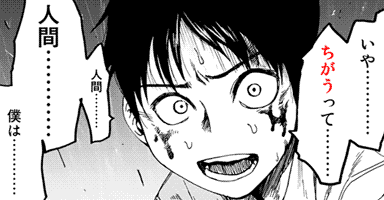
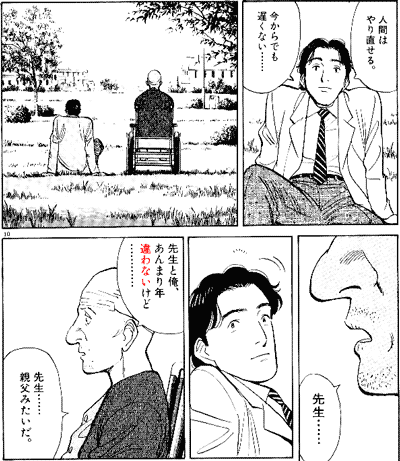
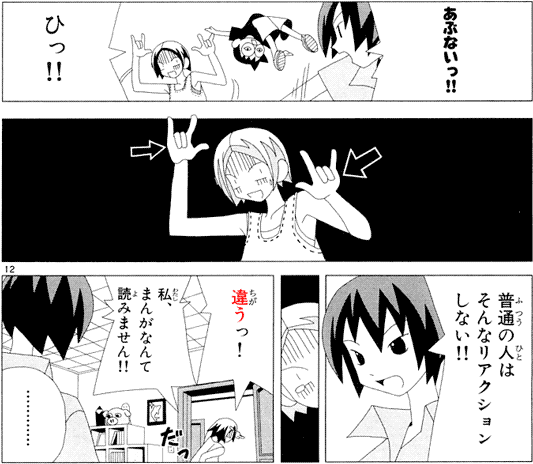
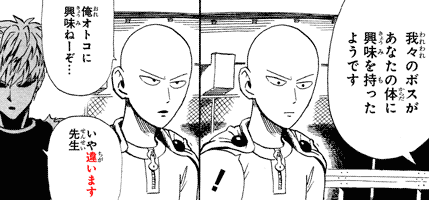
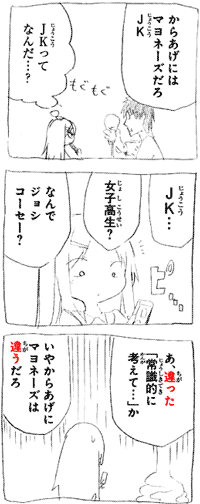
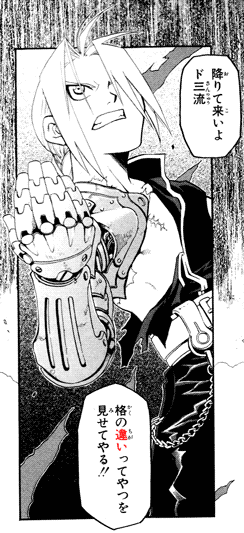
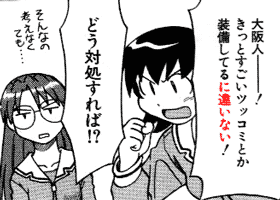
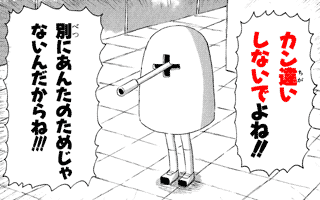

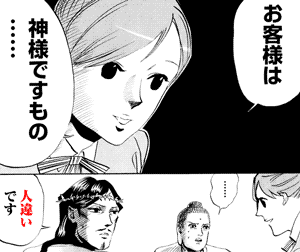
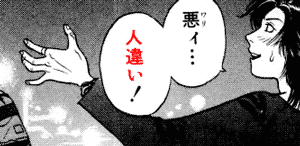
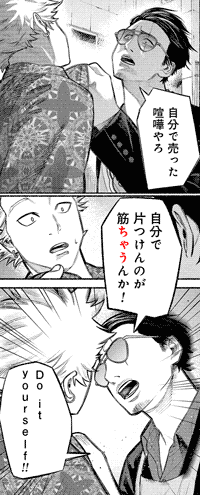
No comments: